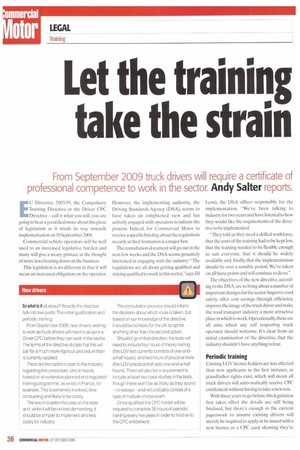Let the training take the strain
Page 38

Page 39

If you've noticed an error in this article please click here to report it so we can fix it.
From September 2009 truck drivers will require a certificate of professional competence to work in the sector. Andy Salter reports.
EU Directive 2003/59, the Compulsory Training Directive or the Driver CPC Directive — call it what you will, you are going to hear a good deal more about this piece of legislation as it winds its way towards implementation on 10 September 2009.
Commercial vehicle operators will be well used to an increased legislative burden and many will give a weary grimace at the thought of more laws bearing down on the business.
This legislation is no different in that it will mean an increased obligation on the operator. However, the implementing authority, the Driving Standards Agency (DSA), seems to have taken an enlightened view and has actively engaged with operators to inform the process. Indeed, for Commercial Motor to receive a specific briefing about the regulations so early in their formation is a major first.
The consultation document will go out in the next few weeks and the DSA seems genuinely interested in engaging with the industry: "The regulations are all about getting qualified and staying qualified to work in this sector," says Jill Lewis, the DSA officer responsible for the implementation. "We've been talking to industry for two years and have listened to how they would like the requirements of the directive to be implemented.
"They told us they need a skilled workforce, that the costs of the training had lobe kept low, that the training needed to be flexible enough to suit everyone, that it should be widely available and, finally, that the implementation should be over a sensible period. We've taken on all these points and will continue to do so."
The objectives of the new directive, according to the DSA, are to bring about a number of important changes for the sector: Improve road safety, offer cost savings through efficiency, improve the image of the truck driver and make the road transport industry a more attractive place in which to work. Operationally, these are all aims which any self respecting truck operator should welcome. It's clear from an initial examination of the directive, that the industry shouldn't have anything to fear.
Periodic training
Existing LGV licence holders are less affected than new applicants in the first instance, as grandfather rights exist, which will mean all truck drivers will auto-matically receive CPC entitlement without having to take a new test.
With three years to go before this legislation first takes effect the details are still being finalised, but there's enough in the current paperwork to assume existing drivers will merely be required to apply or be issued with a new licence or a CPC card, showing they're entitled to work as a professional truck driver.
This will, of course, expire five years later in 2014,and the driver will have had to undertake and keep a record to prove that he or she has undertaken a minimum of 35 hours approved and related training during that period.
It is, as yet, unclear whether it will be the employee or employer who will bear the responsibility for the training.
Every five years subsequently drivers will have to renew their truck licences (there's a change to driver licensing law, which will include five-year renewal of truck licences on the way) and once again undertake and keep a record of a minimum of 35 hours approved driver training during the period.
While keeping training records and actually finding time to do the training will be a hit of a bind, the word from the DSA is that the training will most probably include the sort of driver training many of the truck manufacturers are offering when a new vehicle is delivered,as well as other related courses. Clearly it will have to be relevant to the job. •










































































































































































































